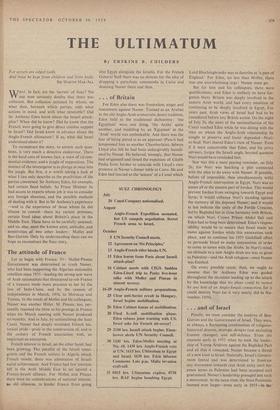•• . of Britain
For Eden also there was frustration, anger and resentment against Nasser. Trained as an Arabist in the old Anglo-Arab aristocratic desert tradition, Eden held to the traditional dichotomy : 'the Egyptians' were one thing, `the Arabs' quite another, and meddling by an 'Egyptian' in the 'Arab' world was unthinkable. And there was the fear of being jeered at as an appeaser (Punch had lampooned him as another Chamberlain). Selwyn Lloyd also felt he had been unforgivably humili- ated by Nasser. He believed, wrongly, that Nasser had originated and timed the expulsion of Glubb Pasha from Jordan to coincide with Lloyd's own presence at Nasser's dinner table in Cairo. He and Eden had reacted to the 'seizure' of a Canal which Lord Hinchingbrooke was to describe as 'a part of England.' For Eden, no less than Mollet, there was one overwhelming urge : Nasser must go.
But for him and his colleagues, there were qualifications, and Eden is unlikely to have for- gotten them. Britain was deeply involved in the eastern Arab world, and had every intention of continuing to be deeply involved in Egypt. For years past, Arab views of Israel had had to be considered before‘any British action. On the night of July 26, the news of the nationalisation of the Canal reached Eden while he was dining with the man on whom the Anglo-Arab relationship he sought to preserve and foster depended—Nuri- es-Said. Nun i shared Eden's view of Nasser. Even if it were conceivable that Eden, and his privy advisers, forgot the Israeli angle, beyond question Nun i would have reminded him.
Nor was this a mere passing reminder, on July 26; for Nun i was hatching a plot connected with the plan to do away with Nasser. If possible, before (if impossible, then simultaneously with) Anglo-French intervention in Egypt, Nun i was to annex all or the eastern part of Jordan. This would prevent Jordan from swinging towards Egypt and Syria; it would enhance Nun's standing against the memory of the deposed Nasser; and it would at last indicate the unity of the Fertile Crescent, led by Baghdad but in close harmony with Britain, on which Nun, Crown Prince Abdul llah and Eden had so long been determined. Eden's respon- sibility would be to ensure that Israel made no move against Jordan while this annexation took place, and to continue his 1955 Guildhall effort to persuade Israel to make concessions in 'order to come to terms with the Arabs. In Nun's mind, no obstacle to a new Anglo-Arab era was so great as Palestine—and the Arab refugees—once Nasser was finished.
On every possible count, then, we ought to assume that Sir Anthony Eden was guided _throughout the decisions leading up to the attack by the knowledge that his plans could be ruined by any hint of an Anglo-Israeli connection, for it could destroy Nun i (as it very nearly did in No- vember, 1956).










































 Previous page
Previous page